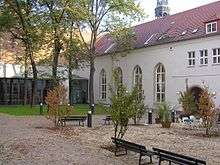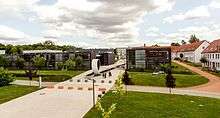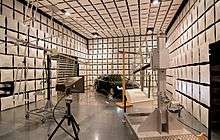Westsächsische Hochschule Zwickau - University of Applied Sciences Zwickau
| WHZ | |
 | |
| Motto | Technology, Economics and Quality of Life |
|---|---|
| Type | Public |
| Established | 1897 |
| Rector | Karl Schwister |
| Students | 4.700 |
| Location | Zwickau, Saxony, Germany |
| Language | German |
| Website |
www |
 | |
The Westsächsische Hochschule Zwickau - University of Applied Sciences Zwickau is a vocational university of about 4700 students located in Zwickau. Saxony, Germany. It offers Bachelor’s, Master’s and traditional German Diplom degrees in three core areas: Technology, Economics and Quality of Life.[1] The university also has further campuses in Markneukirchen, Reichenbach im Vogtland and Schneeberg.
History
Zwickau’s tradition of higher education reaches back to the founding of a Latin school in the late thirteenth century. The origins of the vocational university, however, are more connected to the boom of mining and industrial production in Saxony in the early 1800s. The rise of coal production and processing in the region created a demand for workers with a high level of technical training and industry pushed for the development of educational training institutions. A Sunday training school for workers was opened in 1828, followed by the “Bergschule Zwickau,” a school to teach technical skills related to mining, in 1862. By 1949, the Bergschule Zwickau had developed into a full-fledged mining engineering school. Parallel to the development of the mining school, in 1897 the engineers Paul Kirchhoff and Leander Hummel founded an engineering school in cooperation with the local municipal government. In 1965, the mining engineering school and the general engineering school merged, eventually gaining the right to grant doctorates under the name “Ingenieur-Hochschule Zwickau.” In 1989, the institution assimilated a school for economics in Plauen and a plant-engineering and construction school in Glauchau, becoming a full technical university. After the reunification of Germany, there was an attempt to merge this engineering-focused technical university with Zwickau’s teacher training college into one small university. This idea, however, lacked political support in the Saxon government and did not succeed. The teacher training college was assimilated into the Technical University of Chemnitz and the engineering school was changed to a “Fachhochschule” or vocational university, with the right to grant Bachelor’s and master's degrees, but not doctorates. The name of the engineering school was then changed to the current “Westsächsische Hochschule Zwickau” or Westsächsische Hochschule Zwickau - University of Applied Sciences.
Faculties

Following the motto Technology, Economics and Quality of Life the university is organised into eight faculties:
Applied Arts Schneeberg
The bachelor's and master's degree courses in " DESIGN" offer joint as well as specific courses for themodules Modedesign, Textilkunst / Textildesign and Holzgestaltung / Möbel- und Produktdesign . In the undergraduate course MUSIKINSTRUMENTENBAU with the fields of study of instruments for string instruments and string instruments , high-quality, artistically designed musical instruments are created. [2]
Applied Languages and Intercultural Communication
The study program Languages and Business Administration combines economics, languages and intercultural communication. An excellent education in the target language Spanish, French or Chinese, as well as the second language English, sets the course for an international career.
Automotive Engineering
The Faculty of Automotive and Mechanical Engineering, with its five courses in Automotive Production, Mechanical Engineering, Industrial Management & Engineering, and the new Bachelor / Master's degree in Business Administration
- Business Sciences
- Electrical Engineering
- Health and Healthcare Sciences
- Mechanical Engineering
- Physical Engineering and Computer Science
Programs


The WHZ’s programs are divided into three core areas of focus: Technology, Economics and Quality of Life. The Technology category is the largest and incorporates a range of engineering disciplines, including many directly related to automotive production. The Economics category includes both traditional business administration and management courses as well as interdisciplinary programs such as Business and Engineering or Languages and Business Administration. Finally, the Quality of Life category includes a wide range of practical, interdisciplinary programs from various types of Design to applied Heath Sciences and Healthcare Management.The WHZ has two core campuses within the city of Zwickau as well as three satellite campuses in the towns of Reichenbach, Schneeberg and Markneukirchen. Schneeberg is home to the university’s Applied Arts programs, which include Wood Design, Fashion Design and Textile Arts. Markneukirchen, historically a centre for musical instrument production, hosts the program in Musical Instrument Construction. Reichenbach is home to the Institute for Textile and Leather Technologies.
Research

The university supports research efforts both in connection with both public funding programs and industry projects, with a focus on applied research to solve practical problems. It also supports a high level of knowledge transfer between the academic and business worlds through various industry partnerships. In addition to research by professors and students, more than 150 employees work exclusively on projects supported with third-party funding and generate several million Euros annually in nearly 50 unique fields. This group of projects allows for the continuation and expansion of modern research efforts with a focus on effective, practical results. It also gives the university access to extremely well-equipped laboratories and testing fields.[3]
Student Life


Outside of classes, the university also offers a number of extracurricular activities, including a student choir and a range of casual sport programs. Since 2006, one of the most significant student groups at the WHZ has been the Formula Student Team. The student team constructs a single seat, technically sophisticated race car and competes against other teams around the world at racing events. The competition also includes the business aspects of automotive manufacturing such as marketing and business planning. In 2008, the WHZ has been officially recognized as a “family friendly university.” It offers day-care and kindergarten places for the children of students, a mini children’s library, a children’s sports group and free meal cards in the cafeteria for children under 6. The university’s students’ union operates three student clubs, which host events throughout the school year.[4]
Ranking & Presence
In 2016, WHZ was ranked No. 1 school for studying Automotive Engineering. The automotive Engineering program in this institution allows students to specialize in different phases of the course. These choices are car body engineering, internal combustion engines or automotive service.[5]
MastersPortal reviewed the university on their website quoting "The WHZ is a dynamic, people-oriented university located in a region full of charm. More than 1,000 students from 50 different countries begin their studies here each year, choosing from the 50 study programmes in the fields of engineering and technology, business and quality of life[6]".
Research
Research at the University of Applied Sciences Zwickau has a long-standing tradition. The university's philisophy states that teaching and research reinforce one another, leading to high scientific and technical standards, both in the lab and in the classroom.
Research at the University of Applied Sciences Zwickau has a long-standing tradition. We understand that teaching and research reinforce one another, leading to high scientific and technical standards, both in the lab and in the classroom.
The university supports research efforts in connection with both public funding programs and industry projects, with a focus on applied research to solve practical problems. Our industry partnerships mean that we have a strong capacity for knowledge transfer between the academic and business worlds - the WHZ contributes to securing a thriving and innovative business sector in the region while also maintaining a good understanding of current industry needs.
In addition to professors and students, more than 150 employees work exclusively on projects supported with third-party funding and generate several million Euros annually in nearly 50 unique fields. This group of projects guarantees the continuation and expansion of modern research efforts with a focus on effective, practical results. It also means that we have exceptionally well-equipped laboratories and testing fields available to us. With numerous newly founded institutions, the University of Applied Sciences Zwickau has established a modern, flexible structure for providing research services.[7]
Research and Transfer Center Objectives[8]
- Ecological Energy and Drive Systems
- Traffic and Environment
- Development, Processing,Testing of New Materials
- Efficient Manufacturing Processes in Vehicle and Machine building
- Regional Promotion of Economic-Management and Export Promotion of Small and Medium-sized Enterprises
Links
Website of the University of Applied Sciences Zwickau (german/english
Website of the University Library (german)
Website of the Formula Student Team (german)
References
- ↑ Imagemovie WHZ
- ↑ Zwickau, Westsächsische Hochschule. "Startseite auf WHZ". www.fh-zwickau.de (in German). Retrieved 2017-06-26.
- ↑ http://www.fh-zwickau.de/index.php?id=6344
- ↑ http://www.fh-zwickau.de/index.php?id=6345
- ↑ "Top 10 Automotive Engineering Schools In The World In 2016". Just Engineering Schools. 2014-05-30. Retrieved 2017-06-26.
- ↑ "West Saxon University of Applied Sciences Zwickau - Zwickau - Germany - MastersPortal.eu". www.mastersportal.eu. Retrieved 2017-06-26.
- ↑ Zwickau, Westsächsische Hochschule. "Research auf WHZ". www.fh-zwickau.de (in German). Retrieved 2017-06-26.
- ↑ Zwickau, Westsächsische Hochschule. "Research and Transfer Centre auf WHZ". www.fh-zwickau.de (in German). Retrieved 2017-06-26.
Coordinates: 50°42′58″N 12°29′40″E / 50.71611°N 12.49444°E